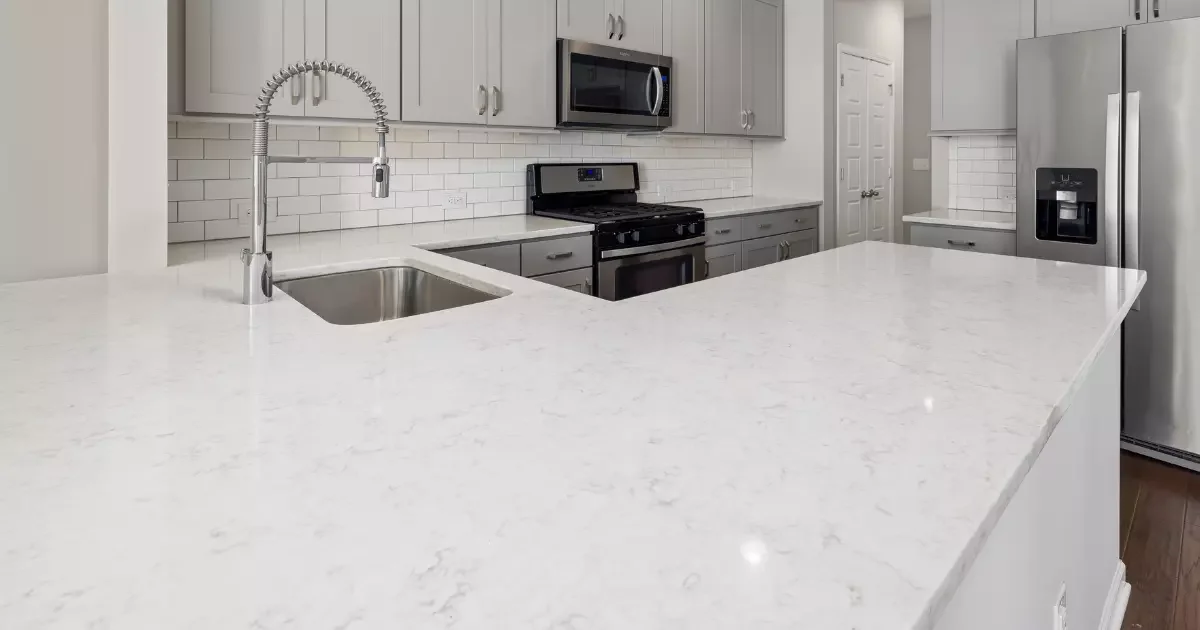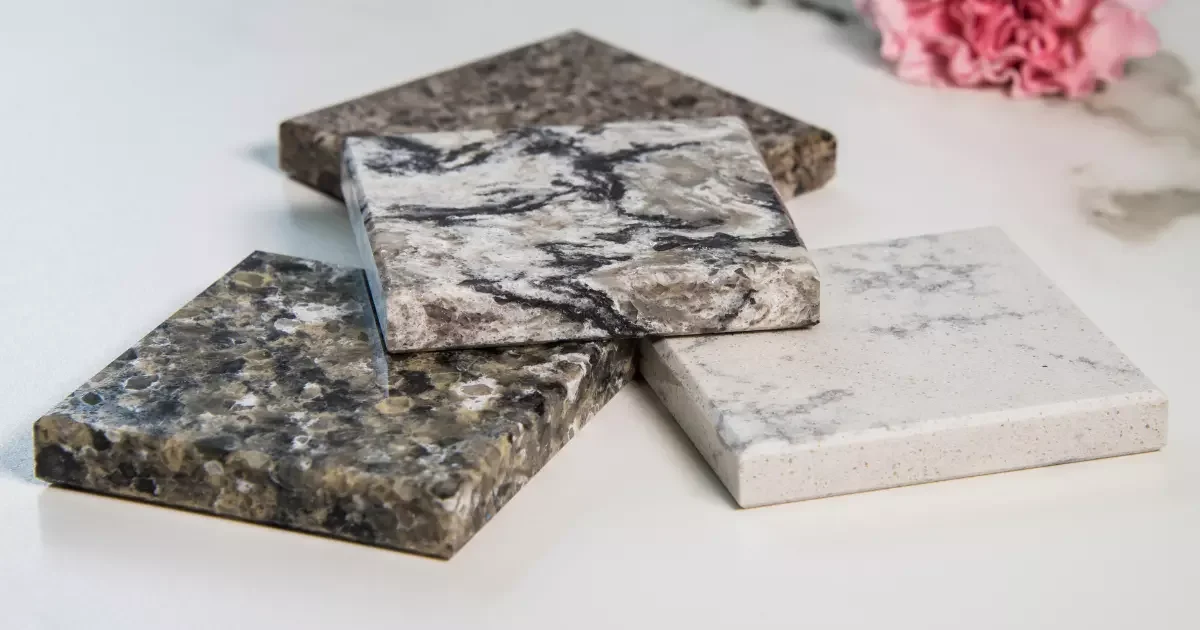What Is the Smart Choice for Your Kitchen: Quartz vs Granite Countertops?
Choosing between quartz vs granite countertops can feel like a big decision for your kitchen. Both bring style, durability, and long-term value, yet each has its own strengths. Quartz countertops are crafted for consistency in color and pattern, while granite offers one-of-a-kind character shaped by nature. The right choice depends on your style, cooking habits, and maintenance preferences. By learning the differences, advantages, and disadvantages, you’ll be able to choose the surface that best fits your kitchen’s needs. By the end, you’ll have the clarity to pick the countertop that matches your vision and lifestyle.
What Are Quartz Countertops?
Quartz countertops are made from engineered stone that blends natural quartz crystals with polymer resins and color pigments. This manufacturing process creates a durable, non-porous surface that resists stains and scratches. With an ease of maintenance that only needs mild soap and water, these countertop materials are ideal for busy kitchens. You can choose from a wide range of patterns, from designs that mimic Calacatta marble to bold contemporary looks. Their uniform appearance makes them a favorite for custom countertop design in modern homes.
What Are Granite Countertops?
Granite is a natural stone formed from molten rock deep within the Earth, often containing striking patterns like those seen in Mount Rushmore. Each slab is unique, with colors and textures shaped by its igneous rock origins. This porous material requires sealing to prevent stains, but it stands out for its heat resistance and natural beauty. Many homeowners value it for its timeless appeal and potential to increase resale value. Granite offers a variety of edge profiles, making it versatile for different color schemes and kitchen styles.
What Are the Differences Between Quartz and Granite Countertops?
Choosing between quartz countertops and granite comes down to more than appearance. These two countertop materials differ in how they’re made, how they perform, and what they cost per square foot. While engineered quartz offers consistent looks and lower upkeep, granite provides a one-of-a-kind surface with a natural origin. Your decision will likely depend on your lifestyle, budget, and design goals. Read down the differences to help you decide which best suits your needs.
Appearance and Style
Quartz countertops offer uniform patterns thanks to resin binders and color pigments, making them a go-to choice for matching a modular kitchen layout. Granite’s beauty comes from natural variation in natural stone, meaning no two slabs are identical. Custom countertop design is possible with both, but quartz offers more predictable results for specific color schemes.
Durability and Strength
Granite is a tough igneous rock that can handle heat from appliances without damage, while quartz is slightly less heat-resistant and benefits from heating pads under hot pots. Engineered stone resists chips and micro fissures better than granite and avoids resin pooling issues. Both are strong, but their resistance to wear depends on how they’re used.
Maintenance and Care
Quartz is non-porous, offering microbial resistance and an antibacterial coating that reduces bacterial colonisation. It needs only mild soap for cleaning. Granite, being a porous material, requires sealing to avoid stains and potential radon gas concerns. Both benefit from gentle cleaning and avoiding harsh chemicals to maintain their gloss finish.
Cost and Value
Granite prices vary by rarity, with countertop prices measured by cost per square foot. Quartz tends to have a stable price range due to its production process. While both can increase resale value, granite’s uniqueness can appeal to certain market segments. Both are considered premium home surfaces compared to butcher block or stainless steel.
What Are the Pros and Cons of Choosing Quartz Countertops?
Quartz countertops excel in ease of maintenance, resistance to stains, and consistent appearance. They come in a variety of edge profiles and mimic high-end looks like calacatta marble or semi-precious stone. However, they can be sensitive to high heat from pots and prolonged UV light exposure in bright kitchens. Their countertop price can be higher than some natural stone options, especially in certain market segments. Still, they remain popular for residential installation due to their durability and custom countertop design flexibility.
What Are the Pros and Cons of Choosing Granite Countertops?
Granite stands out for its natural beauty, heat resistance, and potential to boost resale value. As a natural stone, it offers unmatched uniqueness and depth in color. However, it’s a porous material, requiring regular sealing to maintain its finish and prevent staining. Some slabs may have micro fissures that require care during installation services. Granite can also be more variable in cost per square foot, depending on the quarry source and slab rarity.
Which Countertop Material Should You Choose for Your Kitchen?
Your decision between quartz countertops and granite should reflect your cooking habits, design preferences, and budget per square foot. If you prefer low upkeep, predictable patterns, and ease of maintenance, quartz is a strong choice. If you value natural beauty, unique character, and higher heat tolerance, granite may be ideal. Both can complement a color scheme and blend with features like integrated sinks or porcelain pavers. Consider how each fits your lifestyle before investing in your new kitchen countertops.
Frequently Asked Questions
Which is better for resale value?
Both quartz countertops and granite can add resale value, but granite’s natural uniqueness can appeal to certain buyers. Quartz attracts those looking for modern style and ease of maintenance. Your local market segment can influence which option provides the best return.
Can you put hot pots directly on quartz or granite?
Granite can handle heat from appliances and hot pots better due to its molten rock origins. Quartz is more sensitive and should be protected with heating pads. This prevents potential resin pooling or surface damage.
Which material is more eco-friendly?
Granite, as a natural stone, requires quarrying, which has environmental impact and higher carbon emissions. Quartz uses recycled materials in some brands but involves a manufacturing process with resin binders. The environmental impact depends on sourcing and production process.
How long do quartz and granite countertops last?
With proper care, both can last decades. Quartz’s non-porous surface offers microbial resistance and reduces bacterial colonisation. Granite’s durability comes from its igneous rock composition but depends on regular sealing.
Is one type easier to repair than the other?
Quartz is more resistant to chips and cracks, but if damaged, repairs may be less noticeable in granite’s natural pattern. Granite repairs can blend better with professional installation services, depending on the edge radius and gloss finish.
Wrapping
Choosing between quartz countertops and granite means understanding their strengths, differences, and long-term benefits. Each offers unique qualities that can enhance your kitchen’s style, function, and resale value. The right fit depends on your design goals, cooking habits, and budget.
When weighing options, consider cost per square foot, ease of maintenance, and how each surface handles heat, wear, and your preferred color scheme. Think about how they’ll pair with other counter top materials like butcher block, stainless steel, or porcelain pavers. Both can elevate your home and align with the 2024 kitchen trends report.
At Empirical Construction, we guide you to the perfect choice for your home. Call us today at 720-441-5060 for expert advice and installation services that bring your vision to life.



